Guy Verhofstadt Promotes Internet Union - Less Cows and More Internet
Adelina Marini, May 13, 2014
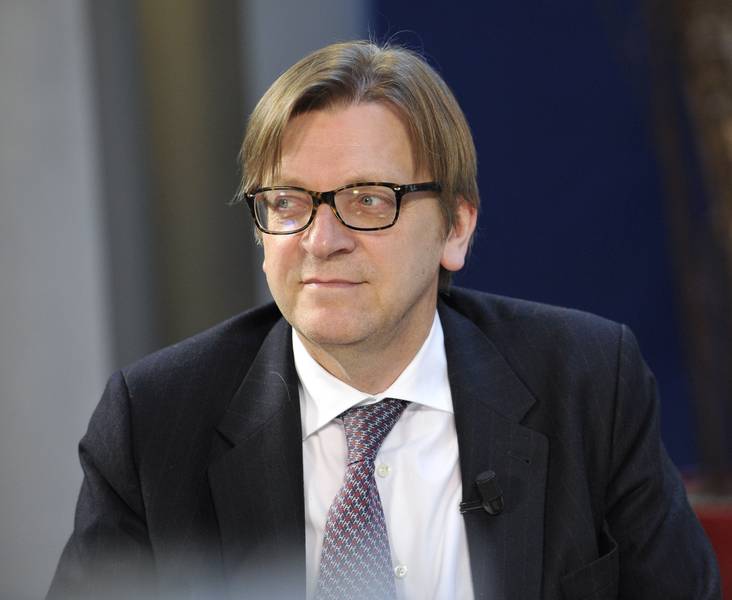 Lately, in the EU, there is a very strong fashion trend - the more the desire for deepening of the integration is weakening, the more ideas emerge for "unioning". In this way, while the last negotiations on the establishment of the banking union were going on, because of the crisis in Ukraine Polish Prime Minister Donald Tusk came up with an idea, supported by France, of an energy union. The idea is deliveries of energy resources from third countries, especially Russia, to be negotiated at central EU level on behalf of all the member states to avoid blackmail of single countries and to reduce excessive dependencies. In the peak of the campaign for the European elections, other ideas started to surface up against the backdrop of the generally quite standard messages. One of the candidates for the European Commission president's seat - Guy Verhofstadt, nominated by the European Liberals - recently presented his vision about Europe, which is the most progressive of all the other platforms and is a continuation of Guy Verhofstadt's work in the European Parliament so far.
Lately, in the EU, there is a very strong fashion trend - the more the desire for deepening of the integration is weakening, the more ideas emerge for "unioning". In this way, while the last negotiations on the establishment of the banking union were going on, because of the crisis in Ukraine Polish Prime Minister Donald Tusk came up with an idea, supported by France, of an energy union. The idea is deliveries of energy resources from third countries, especially Russia, to be negotiated at central EU level on behalf of all the member states to avoid blackmail of single countries and to reduce excessive dependencies. In the peak of the campaign for the European elections, other ideas started to surface up against the backdrop of the generally quite standard messages. One of the candidates for the European Commission president's seat - Guy Verhofstadt, nominated by the European Liberals - recently presented his vision about Europe, which is the most progressive of all the other platforms and is a continuation of Guy Verhofstadt's work in the European Parliament so far.
A key element in his vision is his plan for European-wide wi-fi access to the Internet. It is not precisely in the sense of a banking or an energy union, but resembles a lot. The idea of the former Belgian prime minister is to create municipal networks for wi-fi access to the Internet which will turn the European cities and towns into wi-fi zones. "We should strive to make wireless access to the Internet a universal service. It saves people money, it provides job opportunities, it facilitates innovation and it will make European cities more tech-friendly", Mr Verhofstadt explained during his visit in Dublin of several tech companies, including Google, as part of his European elections campaign.
For the purpose, Guy Verhofstadt proposes to change the focus in the EU budget from agriculture to digital economy. Currently, 277 billion euros are allocated to fund the Common Agricultural Policy and only 1 billion is planned to be spent on ensuring high-speed Internet. He called on spending less for cows and more for Internet. This, against the backdrop of the agreed plan for abolishment of roaming charges on data as of the end of 2015, will be a true revolution in the European integration and can actually create the feeling of a genuine union.
More union at other levels as well
Guy Verhofstadt's plan presents in a much more structured way all his other views on the future of the EU because of which he is often called a federalist, but during the first election debate he explained that the word does not depict very well what he actually wants. A number one point in his plan is the enlargement and completion of the banking union, as planned so far, but in addition with a new credit line LTRO by the European Central Bank that banks will use to pay their contributions to the bank resolution fund so that it can be fully operational much earlier than agreed. This, the former premier believes, will drastically increase the number of cheap credit for companies, especially small and medium ones.
In his plan can also be found one of the ideas he specifically quoted during the first election debate - the establishment of a single capital market that will allow companies to borrow in any member state by using a collateral in another country. For example, a company that wants to take a loan to buy land in Spain should be able to use as collateral property in Sweden. This, he believes, will significantly increase liquidity in Europe and will reduce the interest rates on credits for businesses.
Guy Verhofstadt does not use the phrase "energy union", but from his plan it becomes clear that he foresees something similar to the Polish-French idea. He rather talks of a European energy community which he imagines as a single energy market and grid. The details are scarce on this point, but the formulation hints rather of building connected infrastructure that will allow replacement in times of a crisis. In the plan is mentioned also the labour mobility funding scheme which he outlined during the debate in Maastricht, but here he offers a some more details. According to Guy Verhofstadt, labour mobility should be stimulated by, in order to reduce tensions and fears of "social benefits tourism", offering a common European scheme to take the burden of new workers in the first six months on the basis of the minimum wage of the country of origin. In the info graphics that accompany Guy 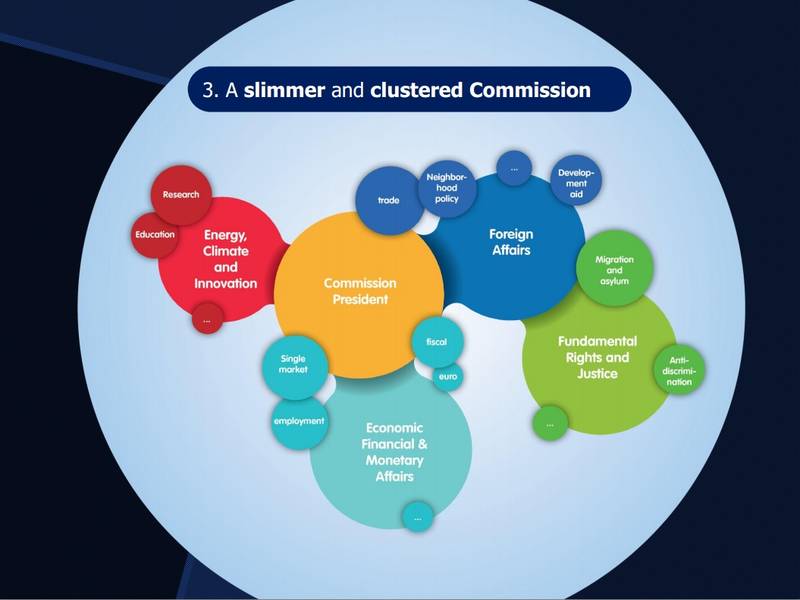 Verhofstadt's plan, there are comparisons between labour mobility in the EU and in Europe. In US, 10% of the population is moving in search of work while in the EU only 2.5% do that.
Verhofstadt's plan, there are comparisons between labour mobility in the EU and in Europe. In US, 10% of the population is moving in search of work while in the EU only 2.5% do that.
Guy Verhofstadt believes that it is important the Commission to become more efficient. He rejects the ideas in the four presidents' plan and Jose Manuel Barroso's blueprint, which are about contractual agreements between the Commission and the member states to implement certain commitments, because, he believes, this is a diktat from Brussels. It is better to set common goals and parameters for pensions, labour markets, productivity, investments in research and development, education and to offer incentives for their achievement. The member states should be bound by Convergence Code which will offer solutions for all. The ideas proposed by the four presidents and Jose Manuel Barroso are, practically, an upgrade of the adjustment programmes for the countries that were bailed out and which are also known as the "Troika's diktat". In the plan of the four presidents, a mechanism of coordination, convergence and implementation of structural reforms is mentioned and takes the form of contractual agreements between the member states and the European institutions.
Barroso's vision is a little different, but, generally, it is also based on agreements between the institutions and the member states in exchange for financial assistance. As part of this reform, Guy Verhofstadt proposes a modernisation of the Commission itself so that it can work in clusters - several major areas like economic, monetary and financial affairs; fundamental rights and justice; foreign affairs; energy, climate and innovation and around them to be structured something like sub-commissioners. It is not clear from Guy Verhofstadt's plan whether he means 4 strong commissioners and the rest to be their subordinates, which will most certainly spur serious controversy among the member states and will hardly pass. The Lisbon Treaty foresaw reduction of the number of commissioners precisely with the aim to make the Commission more efficient, but the member states left a backdoor to be able to reject this via qualified majority. So, the initially planned for this year reduction of the number of commissioners will not happen.
Guy Verhofstadt also proposes common legislation to tackle discrimination because, in his words, the different perceptions of the member states can no longer be tolerated. Another interesting idea of the Liberal is the creation of a European prosecution, but not as a continuation of the idea which is frozen for now and affects only the EU funds. In Verhofstadt's plan, it is envisaged to establish a genuine pan-European prosecution to tackle cross-border crime at common EU level. The European defence community is another idea in the former prime minster's plan, which was also touched during the 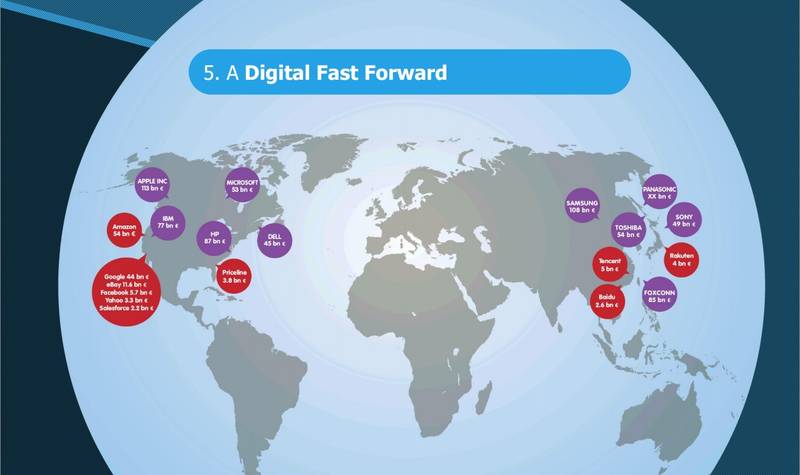 election debates. According to him, it is high time to unite the tools for defence of all the 28 member states which will facilitate the establishment of a truly common foreign policy.
election debates. According to him, it is high time to unite the tools for defence of all the 28 member states which will facilitate the establishment of a truly common foreign policy.
A large part of Guy Verhofstadt's views require serious reforms which means going toward changes of the EU founding treaties. The attitudes against are as strong as those in support of treaty reforms. According to the latest polls, ALDE emerge, again, as a third largest group in the European Parliament with 7.99% of the expected votes or 60 seats in the next European Parliament. This is a significant decline compared to the current situation where ALDE has85 MEPs. No matter how impressive Guy Verhofstadt's ideas are, what is important is how they can be supported and that is, for now, only possible through voting for the relevant ALDE parties at national level. In Bulgaria, let us recall, those are NDSV and MRF (DPS) or, in other words, mission impossible. In Croatia, it is even more complicated - the Liberals here race in a joint list with the Social Democrats and the regional Istra party IDS. The next big debate between the leading candidates will be on May 15th and will be broadcast within the Eurovision network. For Bulgaria, that is the Bulgarian National TV.
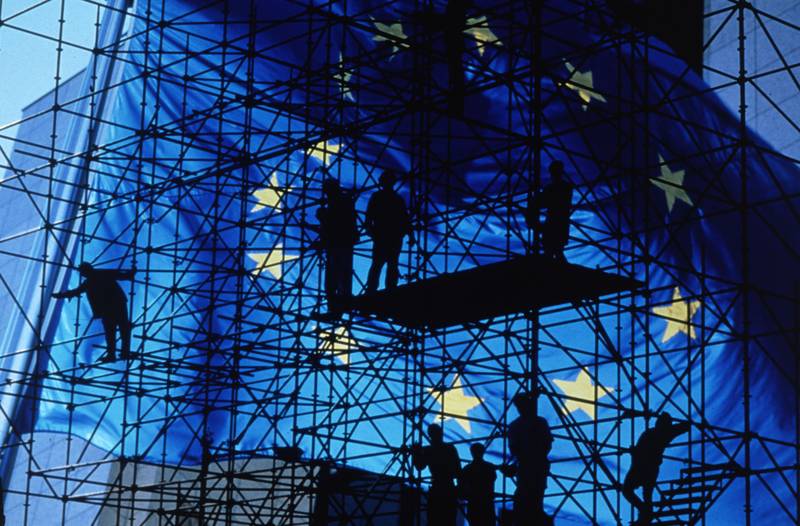 | © European Commission
| © European Commission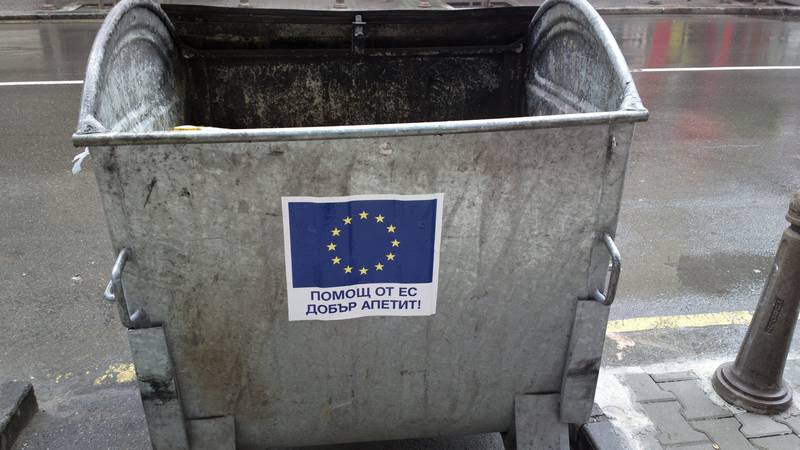 | © euinside
| © euinside Angela Merkel | © Council of EU
Angela Merkel | © Council of EU